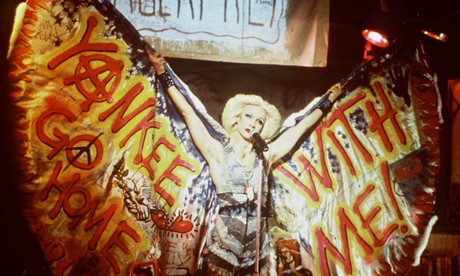
A friend brought me to Hedwig and the Angry Inch a few months after it opened off-Broadway in 1998. I'd heard of the show in passing and hadn't been much tempted. I was just out of college (heaps of Stanislavsky, mounds of Artaud) and perilously serious. I didn't see many musicals unless ordered to – Brecht and Weill obviously excepted.
Hedwig was staged way off-Broadway, in the unrefurbished ballroom of the Jane hotel, at an address so far west you were practically paddling in the Hudson. I don't remember much of a set – just wires, microphones, a drum kit and eventually a bedsheet – which suited me fine, as it made the stage look ready for a rock'n'roll show. And I liked rock shows – the liveness of them, the sense that anything might happen, that giddy feeling when a performer locked eyes and seemed to be singing only to you. Musicals, on the other hand, seemed so pat and prepackaged, even the supposedly sexy and edgy ones like Chicago or Rent.
The lights went down and then came up as John Cameron Mitchell entered in some really frightening denim creation, slashes of blush slicing each cheek, blue glitter ringing the eyes, a blonde wig with wings so outstretched a condor would feel envy. This was different – energised, dirty, risky.
Hedwig is, more or less, a one woman(ish) show with a band, and a nice part for a backing singer. Hedwig can be played by either a woman or a man, the backing singer by a woman in drag. The plot concerns Hedwig Robinson, nee Hansel Schmidt, an East German "slip of a girly boy", who underwent a botched sex change operation in order to marry an American soldier. Abandoned by him at a military base in Kansas, Hedwig strikes up a songwriting partnership and doomed romance with a teen boy who goes on to rock'n'roll stardom, leaving Hedwig to a life of dead-end gigs and occasional prostitution.
Mitchell created the piece gradually, trying out bits at rock clubs and using a jukebox format before dragooning Stephen Trask into writing a gorgeous, glam rock score. (And why hasn't Stephen Trask written more? I would download those albums so hard.) Some of that process filtered into the piece, which seems playful, anarchic and improvised. You know perfectly well it's closely constructed and pretty much the same night after night, but it doesn't feel that way. Even this year's slick Broadway production, with Neil Patrick Harris in the famous wig and platform boots, couldn't kill that sense of spontaneity.
Hedwig is a musical about the slipperiness of gender and the possibilities of personal transformation. It suggests, most directly in the song Wig in a Box, that we can make ourselves into who and what we want to be. A wig, a bit of lipstick, some heels, and there you are.
But as the song reminds us, eventually we, like Hedwig, all must "wake up and turn back to myself." Self-creation only gets you so far, eventually you're thrust back on the body and its limits (and in the case of Hedwig, those limits are an inch long). There's real sorrow and pathos there. And also in Origin of Love, a song that encapsulates Aristophanes's etiological theory of romantic love and loss so beautifully that I used to play it every time I taught Plato's Symposium to first-year college students.
But Hedwig also a glam, glitter-spiked love letter to rock'n'roll. In the closing number, Midnight Radio, Hedwig sings of the peace and sense of belonging that comes when you play that perfect record, that perfect song. She sings to all of us in the crowd who've ever felt misunderstood, unloved or apart, to "all the strange rock'n'rollers – you know you're doing all right."
In the final repeated line, Hedwig echoes the close of David Bowie's Rock'n'Roll Suicide, asking us to lift up our hands, lift up our hands, lift up our hands. I remember lifting mine and clapping so hard they must have ached, and not caring at all.
More from Musicals we love
• Veronica Horwell loves Into the Woods
• Andrew Haydon loves Meine Faire Dame
• Mirian Gillinson loves West Side Story
• Ryan Gilbey loves The Producers
• Michael Billington loves Sweeney Todd

